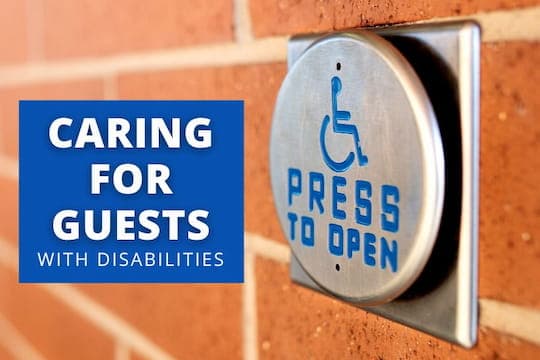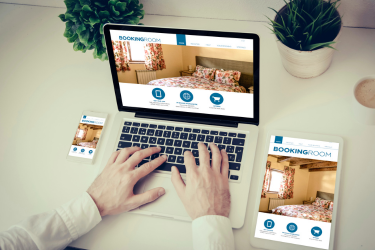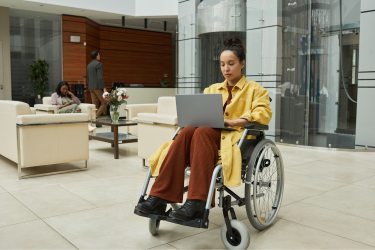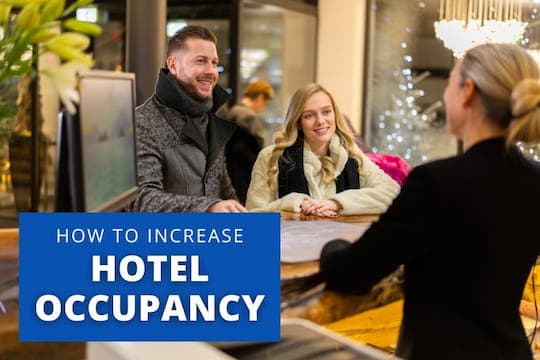Caring for Guests with Disabilities

Fun vacations for able-bodied people can be nightmares for disabled travelers who can't find accommodations. In a world not made for them, they might struggle to visit parks, board a plane, see relatives, or get help from employees. Invisible disabilities make some businesses reluctant to accommodate them, thinking, They look fine, so why do they need help?
Creating a safe, enjoyable experience for everyone means assisting guests with disabilities. Adjustments range from minor service tweaks to floor layout restructures. Since Americans with Disabilities Act (ADA) rules often overlap with safety regulations, your hotel might already practice compliance.
The first step is recognizing that every guest is different. If you've made adjustments for an able-bodied traveler, such as changing a recipe or upgrading their room, you already know how to make accommodations. Listening to guests with disabilities ensures that everyone enjoys their trip.
Be Respectful
Be aware of subtle ways that employees reveal their prejudices. Well-meaning people can still commit microaggressions, such as talking to a disabled person's assistant instead of speaking to them directly, talking about the person like they're not present, dismissing their concerns as unimportant, or assuming that they know the disability better than the guest does.
Instead of making assumptions, validate your disabled guests with these behaviors:
- Introducing yourself
- Talking to them directly
- Making eye contact
- Listening patiently
- Addressing their concerns
- Using written responses for deaf clients
Avoid asking too many questions about the client's disability. For example, asking an autistic guest, Where are you on the spectrum? or Do you have meltdowns? is an invasion of privacy. You can ask questions that help you assist them, but try to avoid going beyond that.
Likewise, respect the guest's personal space. Never move or lean against a guest's mobility aids without their permission, and step back when they feel overcrowded. Talking loudly and standing too close can overwhelm people with sensory issues.
Prepare for Different Diets
Doctors can recommend specialized diets for disabled people, such as:
- Vegetarian
- Vegan
- Gluten-free
- Sodium-free
- Allergen-free
- Low-fat
- Low-sugar

These clients stick to their diets at home but traveling interferes with their plans. Many restaurants don't offer diverse dishes, forcing them to compromise their diet or eat salad while their friends enjoy exotic meals.
To make everyone feel welcome, offer healthy, low-fat, and gluten-free dishes that go beyond raw fruit and vegetables. Avoid charging a premium--many disabled people already have to pay extra fees for their trips.
Review your menu to see which dishes accommodate varied diets. For example, you could give diners the option to remove meat from their chili, soup, or omelet. Some hotels offer a separate menu for people with special needs.
Review the ADA Primer
The ADA primer offers guidelines on creating an accessible facility. You don't have to overhaul your entire business, but recommended changes include:
- Installing wheelchair ramps
- Adding more accessible parking spaces
- Leaving at least three feet of space between aisles
- Reducing clutter
- Providing easy restroom access
- Removing old, non-compliant structures
- Allowing service animals
Overall, your hotel should be spacious, clutter-free, and easy to navigate, with few barriers and clear entrances and exits.
The ADA recommends training your staff so that they can adjust policies for disabled guests. Keeping employees informed reduces the high turnover in the hospitality industry.
Optimize Your Website

Thousands of people book rooms online every month. An organized, ADA-compliant website allows disabled guests to view pictures, watch videos, read about your hotel and make reservations. You'll earn sales that might have gone to competitors or booking platforms with cleaner sites.
ADA recommendations include:
- Adding video captions
- Making the entire site keyboard accessible
- Utilizing alt tags
- Adding labels to forms
- Displaying text clearly
- Organizing tabs and headers
For more assistance, add accessibility tools to your site, such as on-screen keyboards, text magnifiers and options to change text colors. On your end, automated tools scan your site for accessibility and provide feedback.
Once you've optimized your site, apply these changes to your mobile website or app. Your mobile site should have clear text, large buttons, crisp photos, labeled forms and a short loading time. Eliminate oversized pictures and videos that slow down your website for an easier browsing experience.
As a bonus, these changes make your site more functional for able-bodied people, generating even more bookings.
Install a Quiet Area

Crowds, sudden movements, loud noises, bright lights and multiple people talking at once can overwhelm autistic guests and others with sensory issues. Unfortunately, overstimulation comes easily when dozens of travelers crowd your lobby. Overstimulated people can have meltdowns or panic attacks, ruining their experience.
Quiet rooms offer a safe, low-sensory place where people can recover. Set up a room with furniture, dimmer lights and no crowds so that guests can relax before they check into their own rooms. This room should be clearly labeled and accessible from the lobby.
Increase Your Hotel Revenue
When you earn more clients, word quickly spreads about how well you care for guests with disabilities. A hotel revenue management company drives revenue with performance reviews, daily yield management, pace evaluation, group pick-up reporting, forecasting, competitive rate shops and other services. Contact Bridgetown Revenue Management Solutions to get started.


